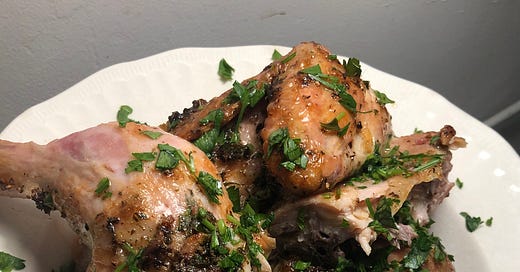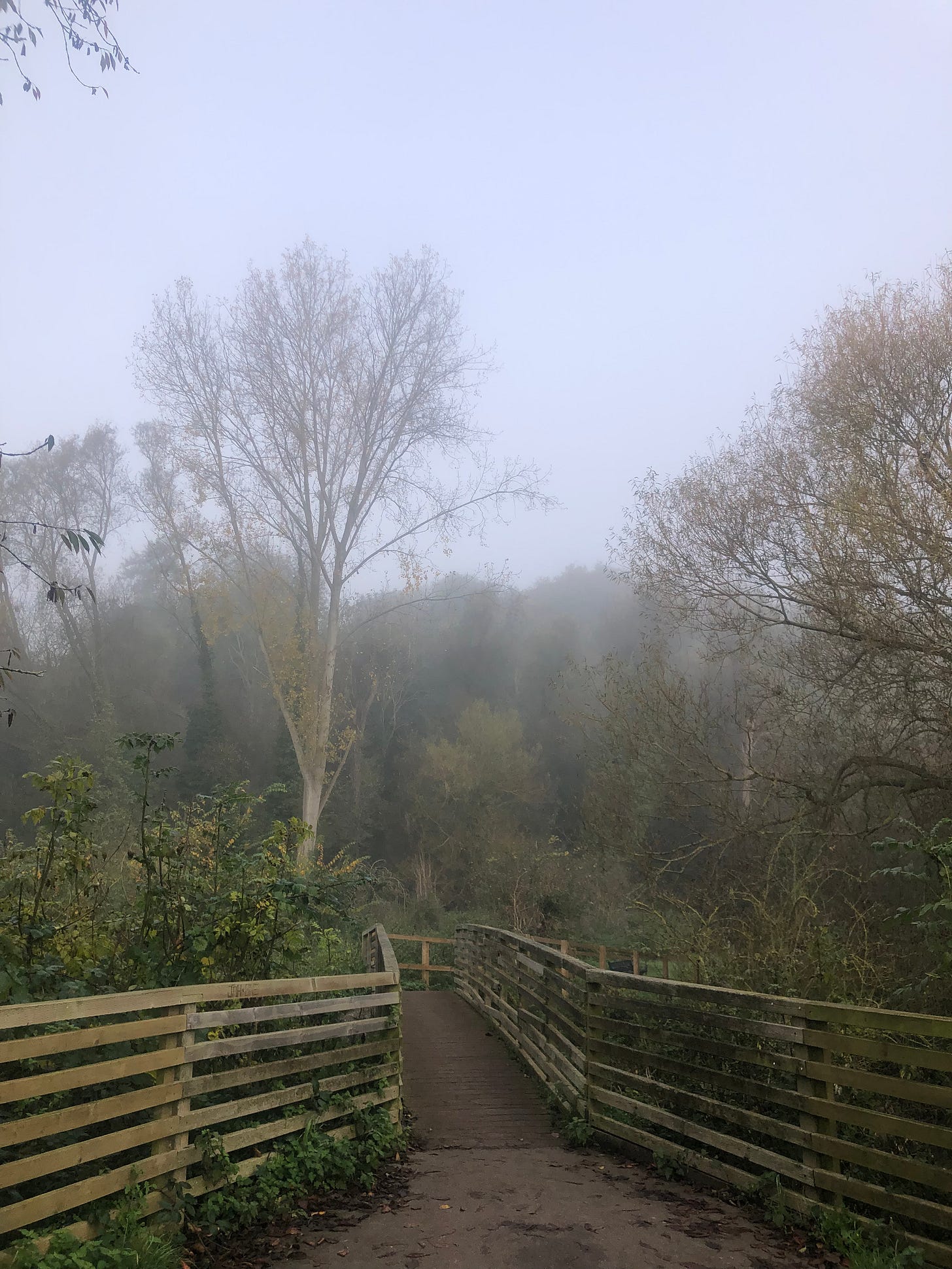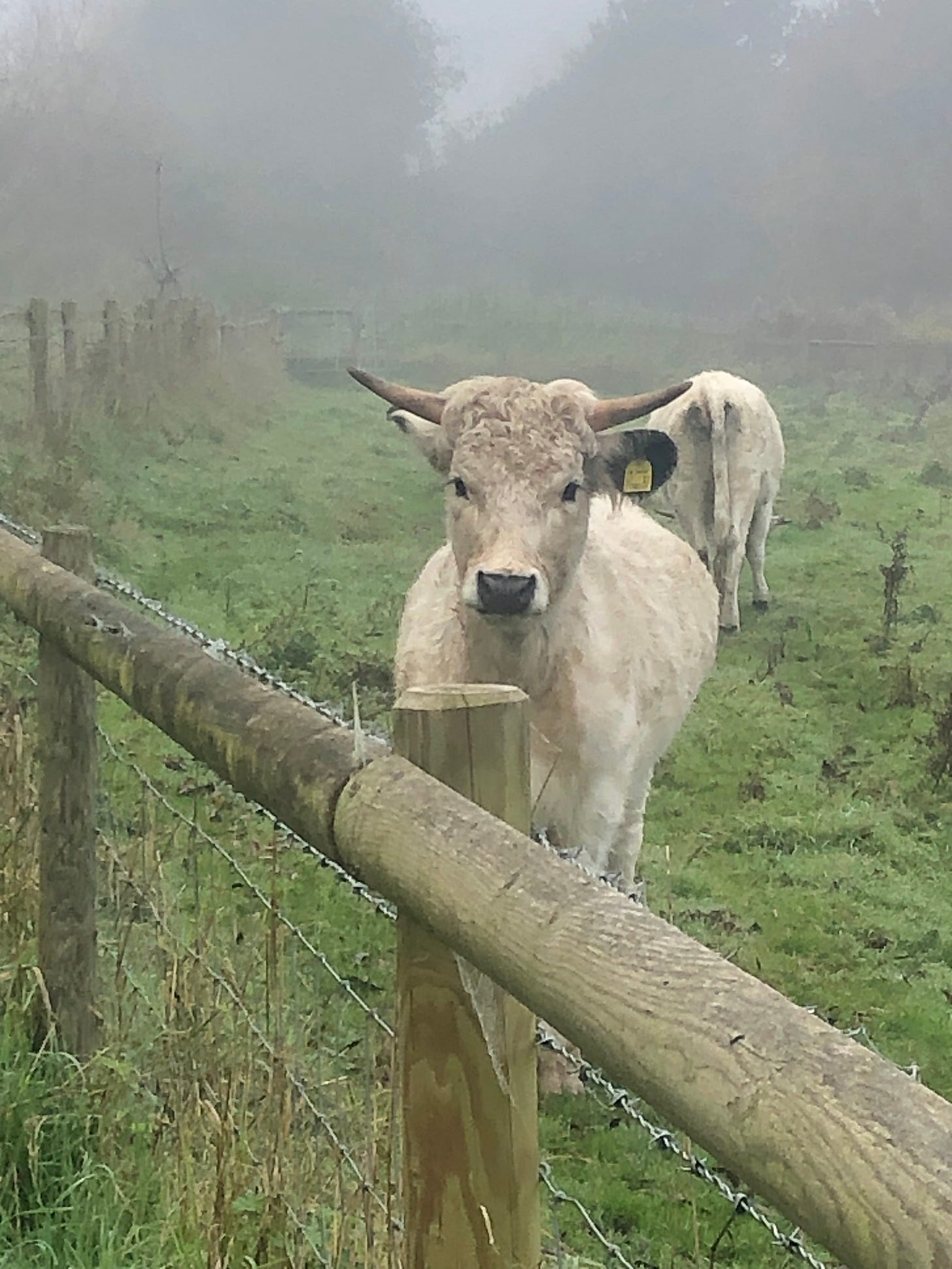total; and by total, I mean I used to cook more, and at one point I stopped cooking as much, and something lost its grip.
On Sunday, I bought a spatchcocked chicken on special at the Woolworths on Lygon Street. $8 for a spatchcocked chicken, and I let it come to room temperature while I sat outside with Henry, and we talked about the day.
After that, I sliced some anchovies and pressed them into butter with fresh parsley and oregano from the edges of our garden, which has been overgrown for a while, but we’re cutting it back. I spread the butter over the chicken, thinking about how I said to you that roasting a chicken always felt like eating a baby, and how I used to cry when I held their bodies over the sink. This chicken was splayed open, very easy. I cracked some pepper, and some more salt.
When I took it out, it was perfect, which I knew because of the movement of the flesh under the skin when I pressed it. I made a sauce over the stove, with eggs, parsley, olive oil, and some vinegar. It thickened under soft heat and whisking, and stayed smooth and perfect on the countertop.
In the other apartment, I would lean out the window and watch my neighbours across the lane while they cooked. Two couples, and a man who, bent over his kitchen bench, read sheets of printed copy. I was cooking lentils, or chicken, or sausages, or something like that, with wine and all these cold cigarettes. I ate a loaf of bread every day; I drank a bottle of milk; I walked up the hill and looked down. The city, it seemed to me, was full of people.
In Housmans, I bought a 2015 issue of the New Left Review for a pound, to read Jameson’s review of Life and Fate:
Reality itself must be compressed, and uncomfortably thrust back on itself, living on top of itself, in order for genuine relations to exist: our own parks and surveillance cameras, the gated communities of the isolated rich only give us a handful of separate individuals, at a distance even from themselves. The bourgeois world gives us families in apartments and cars, in intermittent juxtaposition; even their wars are little more than deadly vacations.
In opposition to this are the ligatures which kill total solitude; human raw material, whose actuality you become aware of again, like a child, in different places.
When Tori visited, it snowed. Snow reveals that the world is a book. It covers over signs, effaces letters, erases lines. Snow is virgin, like a blank album. A return to the dangerous silence of the morning of creation. The meaning of the earth is erased. Not covered over, but removed. Before God marked on the earth the graphics that allow us to know it, it was thus, like a page. Like a sea, like a desert (Michel Serres, Cahiers IX).
Like sea, like desert, like Tori looking outside and saying, Oh. We left the house once, for loaves, and came back, and didn’t leave again until the evening.
In ‘The Art of Fiction’—her essay on E.M. Forster—Virginia Woolf writes,
That fiction is a lady, and a lady who has somehow got herself into trouble, is a thought that must often have struck her admirers. Many gallant gentlemen have ridden to her rescue…[with] a great deal of knowledge of her, but not much intimacy with her. Now comes Mr Forster, who disclaims knowledge but cannot deny that he knows the lady well.
If he lacks something of the others’ authority, he enjoys the privileges which are allowed the lover. He knocks at the bedroom door and is admitted when the lady is in slippers and dressing-gown. Drawing up their chairs to the fire they talk easily, wittily, subtly, like old friends who have no illusions, although in fact the bedroom is a lecture-room and the place the highly austere city of Cambridge.
This came after London’s modernism, which screeches, and the train from Glasgow to Kings Cross, on the bluest day I’d seen, and something like an experience of that greater sense which is present in everything—to not know every place; to not know every person, or every thing—to know a few, well enough; to give a sense of it all.
But outside of the city, I ran through Hartham Common and it opened out into mystery. In the mist, I understood that this was a Romantic reading, and the right one. I called Mum and told her; I touched the head of a beautiful cow; I caught the train back into London, and was angry again.
There was no more waiting than you’d expect, between the trains, boarding another—I don’t have that kind of hunger in the same way anymore, but something different, that thing closer to loving pleasure, or knowing that when I talk like this, I know what I’m after—i.e., a car that’s warm; another kind of shelter.
Love,
Lil






